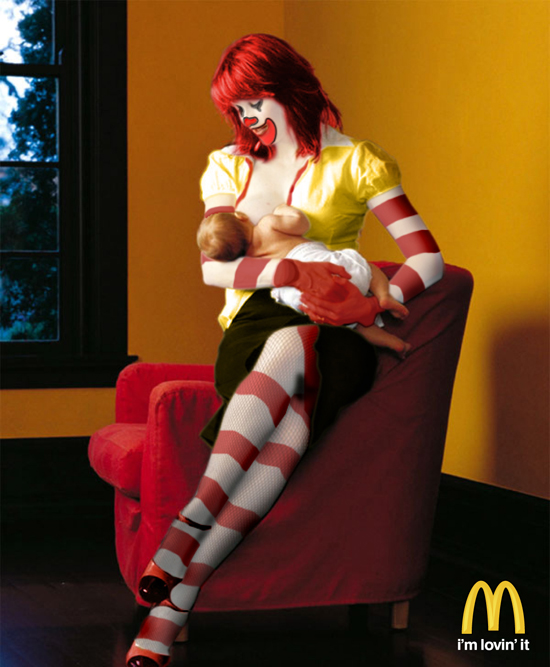“Children 12 and under spend more than $11 billion of their own money and influence family spending decisions worth another $165 billion“[1]
– McMarketing [2]
You say McDonald’s, you say a world. Among millions of topics about it, one is clear: they are great marketers. Hei folks, they sell a tasty, high fat and zero nutrition product (O’Brien, 2011).
To start with, it’s fair to say that McDonald’s is involved in CSR programs from nutrition up to environment through charity. But CSR and junk food taste as a contradiction especially if you advertise on kids. Our kids.
As the columnist for Business Ethics Magazine Gael O’Brien faced in her article “Marketing to Children: Accepting Responsibility”, targeting children in advertisement is a big issue that easily deletes the border between what is ethical from what is un-ethical. Marketing to children is not unconditionally wrong, but it depends on what you sell and how you treat children. They don’t understand the marketing intentions till they are 8. They are vulnerable and can’t raise defensive barriers.
Marketing to children has been a milestone in McDonald’s advertising for years thanks to the awareness that kids are an incredible source of power and a lucrative market. McDonald’s doesn’t offer foods, but an experience and the toys/surprises that you can find in your Happy Meal® build that experience. It’s a misleading exchange between something attractive like a toy and something unhealthy like a burger. They sell a tasty, high fat and zero nutrition product through a toys-driven image of happiness and a familiar environment. Whilst the word ‘obesity’ echoes from the background.
– McDonald’s Commercial [3]
Certainly it’s up to parents educate their kids about healthy products, and they can’t be saved from their responsibilities, though when they are daily bombarded from catchy commercials, restaurants almost everywhere, appealing products and toys it is quite straightforward to be persuaded.
Marketing to children can be deceptive and ethics loses when the contradiction wins. Ronald McDonald’s is a clown, is a “friend”, but above all he is a brand. The Happy Meals® toys are nice, a tradition and a sponsor. McDonald’s can’t forgo them. But they should understand how their great power narrows the parents’ control over children who are used as pawns.
“The chain is McDonald’s-children-parents.
It should be McDonald’s-parents-children.” [4]
They have more power they wanna show and they are protect. Also the law seems to be ineffective against such a system. Marketing to children is a thin way of marketing, it is visible, but not enough to be socially unacceptable by the most. What does it means? It means that the CSR remains CSR about what they want. About what they’re lovin.
Bibliography:
[1] Tom McGee and Kevin Heubusch, `Getting Inside Kids’ Heads’, American Demographics, Vol. 19, No. 1 (1997), quoted in Sharon Beder, Marketing to Children, University of Wollongong, 1998.
[2] Speider Schneider, ‘McMarketing: McDonalds Marketing And Advertising Hits And Pits’. Retrieved from http://www.noupe.com/inspiration/mcmarketing-mcdonalds-marketing-and-advertising-hits-and-pits.html
[3] CSPITV, (2010, Dicember 14). McDonald’s Megamind Commercial [Video file]. Retrieved from https://www.youtube.com/watch?v=5YQOZoPtCO0
[4] mine


Thanks for writing an ethics post, Alberto! Targeting vulnerable audiences is an interesting issue in marketing.
Would be interesting to know how you think McDonald’s should market families, if at all…?
Pingback: Re: I’m Lovin Kids (because they don’t understand the marketing intentions) by Alberto Bettini // [M]ild [M]ild [W]arketing
Thanks for the question. Actually I was beyond the 300 words so I didn’t face the problem, but I acknowledge that it is an important issue. Certainly, McDonald’s has a great deal with marketing to children because they have always been one of the company’s main target and the perfect mean to bring families into the restaurants. Hence, it is not easy to think a McDonald’s campaign without the toys or the sponsorship by a movie for kids, or again without the presence of Ronald McDonald’s. Despite this fact, I think that if McDonald’s was able to improve the quality of its burgers and prove that they are not so unhealthy, it could be willing to forget about the surprises and focus its campaign on the food targeting the parents by highlighting the value of a unique experience, the environment, the familiar atmosphere they offer. Moreover, if many kids are attracted more by the toy than by the burger itself. McDonald’s can link these toys to a Happy Meal with healthy foods inside: it would be an exchange, but not so unfair as now it is. I am a bit pessimist about the possibility that McDonald’s can change the target of its advertising, but if it does, I guess they should target parents with a top-down approach and consequently bring children into their fast food restaurants.